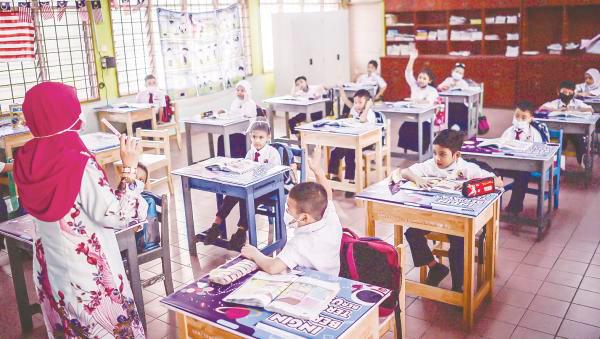THE United Nations Educational, Scientific and Cultural Organisation Global Report on Teachers highlights that “teachers are central to unlocking every learner’s potential and achieving Sustainable Development Goal Four, which includes equitable and quality education for all”, that I believe garners widespread agreement.
With such a claim, teachers hold a profound responsibility not only to impart knowledge but also to nurture the holistic development of their students.
They wear different hats and serve as guides, mentors and facilitators in shaping young minds and instilling in students the skills, values and attitudes needed to thrive in a rapidly changing and challenging world.
While the teaching profession stands at the heart of shaping future generations, it grapples with several challenges that impede its effectiveness and prestige.
One major issue is the high workload and limited resources teachers often face, leading to burnout and decreased morale.
Malaysian teachers are bogged down with unnecessary administrative and external work that requires a lot of time in preparation, which at times can take up their teaching hours. This matter has been voiced out but little action has been taken to reduce these unnecessary workloads.
Many programmes and instructions from the Education State Office and Education District Offices need to be monitored by the Education Ministry.
In practice, some of the instructions provided to schools are incongruent or misconstrued with the initiatives set by the Education Ministry. It is good to have other additional programmes in schools to expose students to some of the values instilled in the programmes but schools should be given the autonomy to choose the most relevant based on their specific context.
Eliminating unnecessary programmes, such as the “Best Toilets Competition”, is essential for optimising resources and time allocation. The initiatives aimed at improving facilities and teaching about cleanliness are commendable but it is crucial to prioritise investments and activities that directly contribute to the core mission and objectives of our education.
The second issue is related to the lack of recognition and competitive compensation for educators. Offering acknowledgement for teachers’ efforts is important for cultivating dignity, professional ethos and drive. Such recognition holds substantial potential in enhancing the societal status of educators.
To address these issues and uphold the teaching profession, several strategies can be implemented. Firstly, investing in professional development opportunities that offer continuous training and support will help teachers stay updated with modern pedagogical approaches, techniques and technologies. This in turn will enhance their pedagogical practices in the classrooms.
Secondly, providing adequate resources and supportive working environments can alleviate stress and improve job satisfaction among educators. For example, consider the current state of teachers’ rooms. Are they conducive environments that offer a comfortable workplace for educators?
Those schools with good Parent Teacher Association support will invest not only in providing good support for the students but also in creating good offices for the teachers. However, schools with limited support have to endure working in challenging conditions, such as hot, cramped rooms with poor ventilation. Therefore, in promoting the “Sekolah Sejahtera” initiative, we should not ignore the teachers and their working conditions.
Moreover, enhancing the status and perception of teaching as a career is essential in transforming the teaching profession. This can be achieved through public awareness campaigns highlighting the importance of educators in shaping society and the economy.
Celebrating exemplary teachers and showcasing their impact can inspire others to pursue teaching as a fulfilling profession.
Emphasising the value of education and the transformative role teachers play can instil respect and admiration for the profession.
In this era of technology, where teachers are expected to be digitally literate, there should also be an effort by the ministry, state or district offices to highlight and showcase teachers’ efforts and educational practices via various media platforms. This serves to uplift and highlight the noble aspects of the teaching profession.
However, this should not be made a competition between schools, but be based on genuine practices with the intention to motivate other educators to adopt and adapt any promising methodologies shared. Such an approach can ultimately foster positive perceptions of society towards teachers and the teaching profession.
Teachers should be able to think, decide and choose suitable materials, appropriate pedagogical approaches and assessment methods. Granting teacher autonomy provides the opportunity to cultivate innovation and reflective practices, allowing teachers to tailor their instructions to meet the diverse needs of students.
Autonomy also promotes a sense of ownership and, hence, can increase job satisfaction among teachers. This kind of empowerment will lead to a collaborative environment, where peer learning and leadership opportunities thrive.
Schools that support autonomy typically have a positive culture and prioritise student-centred approaches that lead to alignment with professional standards and ultimately improving educational outcomes for teachers and students.
This is evident in the Teacher-Led Learning Circle for Formative Assessment project, which was coordinated by the National Union of the Teaching Profession in collaboration with Education International, where it was observed that teachers who gained support from school administrators on teaching and assessment ideas tended to be more creative and motivated towards improving teaching and learning.
In conclusion, transforming the teaching profession requires concerted efforts to address its challenges, uphold its value and cultivate positive perceptions.
By investing in teachers, promoting their status and fostering a culture of appreciation, we can ensure that the teaching profession thrives and continues to shape a brighter future for generations to come.
Happy Teachers’ Day.
The writer is the deputy dean of research at the Faculty of Education at Universiti Malaya and the Education International-appointed country researcher for the T3LFA project. Comments: letters@thesundaily.com









